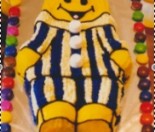Ever wonder what to do for your child’s birthday party? Do you feel pressured to keep up with the latest party trend? Maybe your children expect bigger and better parties each year while you’re struggling to cope? Here are some children’s birthday party ideas that will save your sanity and won’t blow your budget.
Keep things simple
Kids are often happiest when taking things back to basics. Try not to go overboard when planning your child’s birthday party. Consider the amount you can realistically afford to spend, time available for planning and holding a party, and whether your child is celebrating a milestone birthday. Don’t feel pressured to meet or exceed other’s expectations. No matter what the occasion, children (and adults) value the chance to relax, have fun and celebrate with friends.
Keep the party to a reasonable timeframe. A general guideline is one to two hours for pre-school children and between two and four hours for older children. Morning or afternoon tea is often a good time for children and parents alike.
Provide simple and inexpensive food – children are often too excited to eat large amounts. Savouries, cheerios, sandwiches, popcorn, chips, home baking, a few lollies and cake are generally well-liked, minimising any waste. Offer healthy options alongside party treats. For lunch or dinner-time parties have a picnic or barbeque and ask friends to help out or bring a plate. Make your own invitations and re-use birthday-themed decorations, plastic table cloths and candles each year.
With many parents working in addition to raising a family, time to plan, organise and host a child’s birthday party can become limited. This can place unnecessary stress and pressure on families. Consider time-saving shortcuts such as buying a birthday cake – keep your expectations realistic.
Age-appropriate
When children are younger, they tend to socialise with a larger group of friends and this can make it hard for parents to limit party attendance numbers. As children get older, their group of friends tends to become smaller – this makes it easier to limit birthday parties to just two or three close friends. Remind children that parties are about having fun with friends, not ‘stuff’.
Older children can begin to understand the need to prioritise where money is spent and learn about budgeting by getting them involved in party planning and providing them with reasonable choices.
Birthday cakes
When it comes to cake-making, there appears to be an unspoken expectation for mothers to ‘do it all’. Kiwi mums often put pressure on themselves to bake the ‘perfect’ cake. Remember, at the end of the day, children are just happy to eat cake.
Ensure your expectations are practical and realistic.
Hiring or buying specialty cake-tins can be expensive, especially if there is limited re-use such as birthday numbers or TV cartoon characters. Try shopping for online or second-hand bargains before heading to specialty cake stores. Another option is to trace your design onto paper, using this as a template for cutting your cake to shape and size.
If you’re on a budget and looking for ways to save money, or you enjoy the creative process: bake your own cake. There’s no need to recreate a cookbook masterpiece. Get the kids involved with baking and decorating – plus cleaning up any mess afterwards. The internet and libraries provide free resources and information on cake decorating, as well as ideas for themes and games for kid’s parties.
Party bags
Many parents feel pressured and obliged to provide party bags because their children are given them at other parties, with some party bags worth more than the gift given. It can be expensive to create party bags, even when buying cheaper items. As an alternative, buy a small gift for each child and give that as a lucky dip at the end of the party.
Remember it’s OK to say no to party bags. If you provide party bags, don’t go overboard – keep them simple and cost-effective, using items such as a balloon, piece of cake and lollipop. Party game prizes or balloons with spot prizes inside can also be good alternatives to party bags.
DIY entertainment
Parents can sometimes feel unsure or unconfident about hosting their child’s birthday party. However, traditional party games such as freeze, pass the parcel, musical chairs, pin the tail on the donkey and treasure hunts are easy to do and will keep children engaged and entertained for long periods of time. Colouring-in, craft activities, water balloons and decorating gingerbread men or biscuits are also great for entertaining children. Write down a simple party plan of activities and timeframes to keep focused and on track.
Create your own party games and accessories with craft supplies or enlarged colouring pages. Purchase small, cost-effective prizes or make your own. Buy good quality face-paint and teach yourself some basics from the internet or books.
Themed parties often work well – you can tailor them to your child’s interests, such as fairies, vehicles, animals or sport, or time of year, such as a mid-winter Christmas, beach/sandpit or holiday theme.
Don’t try to do everything yourself – ask your friends or family members to assist.
Create lasting memories
Most children want to celebrate their birthday with friends and family. How they celebrate is possibly less important to them than spending time having fun with friends. Remember active experiences create lasting memories.
A memorable experience will stay with children long after the latest ‘must-have’ toy or latest party trend has been discarded or forgotten. Keep this in mind when planning your child’s birthday party, ensuring an enjoyable experience for all.





